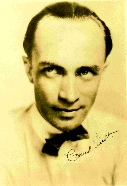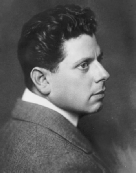
The Conrad Veidt Society
''Max Reinhardt alone is the exception. He and he alone has properly grasped and understands the theater of our times. There proceeds from Max Reinhardt a spirit or essence in rehearsals, recitals and first nights which could flow from no other person. He so inspires the actors that many of the actors would be nothing without him. He understands actors, their life, their characteristics, their ambitions. All others are merely business people or literary men. But Reinhardt is a Director, a Theater Director!''
-
Max Reinhardt was born at Baden near Vienna, Austria on September 9, 1873
He was educated at the Untergymnasium, and was in a banking business until the age of 17. He did not want to be a banker, however, and decided to attend the School of Acting of the Vienna Conservatorium.
Sometime during 1890, during Reinhardt's first year of training at the Conservatorium, famed critic director Otto Brahm visited the Conservatorium in search of talent. Brahm noted the student Reinhardt, a short, somewhat stodgy actor who had in him the material for a character actor of the first order.
After waiting for Reinhardt to gain a year's experience, Brahm visited Salzburg and the Stadt Theatre in 1893, where Reinhardt was working professionally, and offered him an engagement at the Deutsches Theatre, then as now the foremost German theatre. Its prestige among actors at that time was as great as that of the Comedie Francaise among French actors.
Reinhardt soon made his present felt at the Deutsches Theatre, and in a theater where
all actors were equal in the sight of the director, he was able to prosper. Reinhardt
closely watched parts he was suited to play, and studied them. His 'big break' came
during a production of The Beaver Fur by Gerhard Hauptmann. The actor scheduled to
play Müller, the old skipper, committed suicide on the eve of the production. Brahm
was in a fix -
In one scene of The Beaver Fur, a merciless satire on Prussian bureaucracy, the old
skipper has only to do 'reaction' business. Reinhardt gave his reactions such remarkable
by-
His future roles included Ibsen's old man Foldal, Hauptmann's Baumert in The Weavers, Tolstoy's Akim in The Power of Darkness, the depraved cabinet maker Engstrand in Ibsen's Ghosts, the philosophic Mortensgard in Ibsen's Romersholm, and the moody headmaster Störmer in Dreyer's Probationers.
Naturalism
Naturalism was the keynote of Reinhardt's acting roles. Naturalism was making itself strongly felt in German acting at about the time he joined the Deutsches Theater company. Brahm promoted it, and Reinhardt had many experienced actors to learn from: Josef Kainz (the first to introduce psychological acting at the Deutsches Theater); Rudolf Rittner; and Agnes Sorma.
Wanting to increase his experience, Reinhardt left the Deutsches Theater for the
''Freie Büne,'' a dramatic institution mirroring in some respects the London Stage
Society in England. After learning everything he could there, he became involved
in the ''Ueberbrettl'' (Cabaret) movement. This movement was attracting the attention
of exponents of the 'new spirit' in drama, art and literature throughout Germany.
(An example of this ''artistic cabaret'' made its appearance in England about 14
years later -
Reinhardt and friends Christian Morgenstern, Friedrich Kayssler, Richard Vallentin, and Martin Zickel, gathered in a restaurant in the Lessingstrasse, where they founded the ''Brille'' (similar to how Whistler and his confreres used to meet in the Six Bells in Chelsea, where the Chelsea Arts Club was founded.
The ''Brille''
The ''Brille'' was conducted privately, only members, mostly comedians, , and their
friends being allowed to participate in the sing-
The ''Brille'' flourished. Its members grew in number and quality. Soon this tavern-
The ''Schall and Rausch'' parodied well-
Throughout the ''Freie Buhne,'' ''Ueberbrettl,'' and ''Schall und Rausch period,
Reinhardt remained under the formative influence of Brahm. As Reinhardt's literary
ambition grew, so the character of his entertainments changed. In 1901 he abandoned
the variety stage for the literary theatre. He marked his departure by producing
two one-
Kleines Theater
With the beginning of the new season on August 2, 1902 (when Reinhardt was 29, the name ''Schall und Rausch'' was changed to the ''Kleines Theater''. One of Reinhardt's first successes at this theater was Strindberg's Rausch. This was followed by the Salome sensation. It had been arranged to give a public performance of Oscar Wilde's Salome, but the censor banned it. Thereupon Reinhardt produced the piece privately (as it became by 1914 the custom in England). Eysoldt played Salome and the rest of the cast included Hayssler, Louise Dumont (by 1914 intimitately connected with the Düsseldorf Theater) and Reinhardt himself. This production inspired Richard Strauss to write his Salome opera.
On January 1, 1903 Reinhardt left the Brahm ensemble for good, in order to concentrate upon directorship, although he did continue acting for a time.
Owing to the long run of The Lower Depths, and in order to fulfill other contracts, Reinhardt had tio find a larger theater. In 1903 he took over the ''Neue Theater,'' while still retaining the Kleines Theater.
Reinhardt never considered a piece unplayable. The more difficult the play to be
produced, the more boldly he emerged. In 1909 Maurice Maeterlinck wrote to Reinhardt,
confessing that he owed him a debt of gratitude -
Deutsches Theater
In 1905, Adolph l'Arronge was seeking a new man for the Deutsches Theater. He chose Reinhardt, and in the autumn of 1905 Reinhardt became producer at the Deutsches Theater. He gave up control of the Kleines Theater, and after another year relinquished control of the Neues Theater.
At the Deutsches Theater on Schumanstrasse, Reinhardt focused on organization, making the theater a cosmopolitan center for English, Belgian, Austrian, German, Russian, and Scandinavian players. He made it a center for the plays of the younger Sturmer und Dranger of his time, including French authors.
At the Deutsches Theater on Schumanstrasse, Reinhardt focused on organization, making the theater a cosmopolitan center for English, Belgian, Austrian, German, Russian, and Scandinavian players. He made it a center for the plays of the younger Sturmer und Dranger of his time, including French authors.
SOURCESThe Theater of Max Reinhardt, by Huntly Carter. Copyright 1914. Benjamin Blom, Inc.
Max Reinhardt

1873-